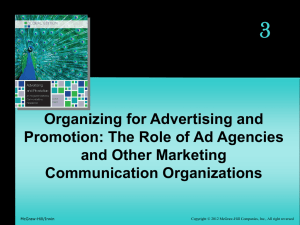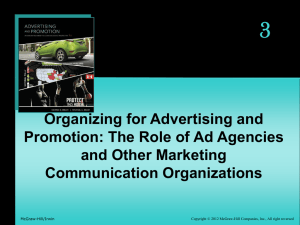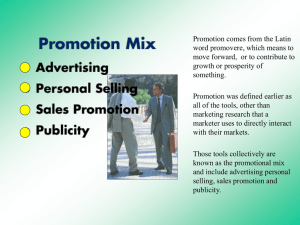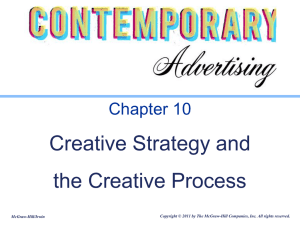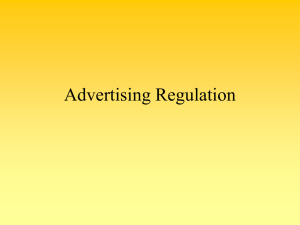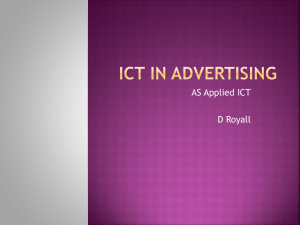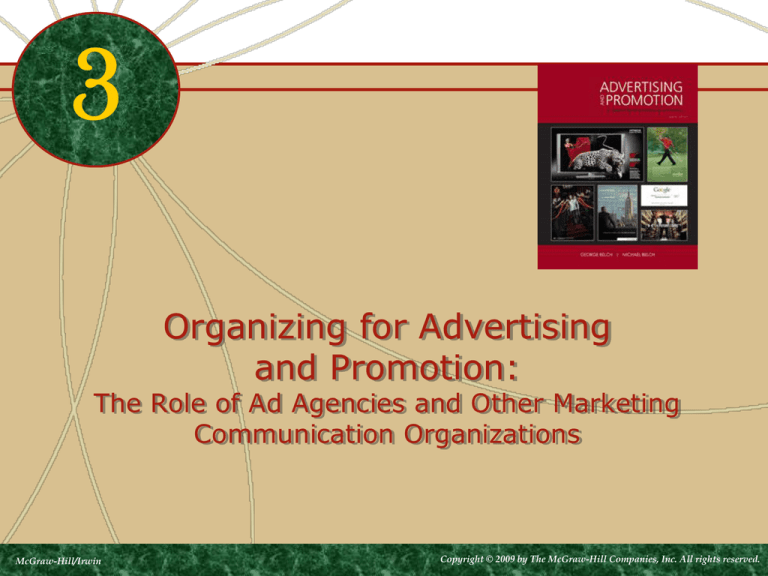
3
Organizing for Advertising
and Promotion:
The Role of Ad Agencies and Other Marketing
Communication Organizations
McGraw-Hill/Irwin
Copyright © 2009 by The McGraw-Hill Companies, Inc. All rights reserved.
Participants in the IMC Process
Advertiser (Client)
Advertising agency
Media organizations
Marketing
communications
specialist
organizations
Collateral services
Directresponse
agencies
Sales
promotion
agencies
Public
relations
firms
Interactive
agencies
Organizing for Advertising and Promotion
• The way a company (the client)
organizes depends on
– Its size
– The number of products it markets
– The role of advertising and promotion in
the marketing mix
– The budget
– Its marketing organization structure
Advertising Dept. Under Centralized System
President
Production
Finance
Marketing
research
Marketing
Advertising
Research
and
development
Sales
Human
resources
Product
planning
Pros & Cons of a Centralized System
+ Positive
- Negative
Better
communications
Less goal
involvement
Fewer
personnel
The
Centralized
System
Longer
response time
Continuity
More top
management
involvement
Impractical for
multiple brands,
products,
divisions
Decentralized Advertising System
Corporate
Production
Finance
Sales
Marketing
Product
Management
Brand
Manager
Ad agency
R&D
Human
Resources
Marketing
services
Advertising
Dept
Marketing
Research
Sales promotion
Brand
Manager
Package design
Ad agency
Merchandising
Pros & Cons of Decentralization
+ Positive
- Negative
Ineffective
decision making
Concentrated
attention
Rapid problem
response
Increased
flexibility
The
Decentralized
System
Internal conflicts
Unequal
distribution
of funds
Lack of
Authority
Test Your Knowledge
A major reason why some companies choose to use
an in-house agency is to:
A) Maintain creative freshness
B) Reduce advertising and promotions costs
C) Better understand how advertising works
D) Win advertising awards that will enhance
the image of their brands
E) Do all of the above
In-House Agencies
Benetton’s in-house agency works with
outside agencies to develop ads
Pros & Cons of In-House Agencies
+ Positive
- Negative
Cost
savings
Less
experience
More
control
Better
coordination
The
In-house
Agency
Less
objectivity
Less
flexibility
The Ad Agency’s Role
• Reasons for using an ad agency
– Highly skilled specialists
– Specialization in a particular industry
– Objective viewpoint of the market
– Broad range of experience
Ad Agencies Have Skilled Specialists
Artists
Writers
Researchers
Photographers
Media Analysts
Other Skills
Full-Service Agencies
Planning
advertising
Creating
advertising
Producing
advertising
Full range of
marketing
communication
and promotion
services
Direct
marketing
Selecting media
Interactive
capabilities
Strategic market
planning
Sales
promotions
Performing
research
Nonadvertising
services
Package design
Public relations
and publicity
Typical Full-Service Agency Organization
Board of
directors
President
VP creative
services
VP account
services
Print
production
Writers
Art directors
TV
production
Traffic
VP marketing
services
Media
Account
supervision
VP management
and finance
Sales
Promotion
Research
Office
management
Account
Executive
Finance
Accounting
Personnel
Services Provided by Agencies
Agency Services
Account
Services
Marketing
Services
Creative
Services
Mgmt &
Finance
The link
between
agency and
client
Research
department
Creation,
execution of
ads
Accounting
Copywriter
artists,
other
specialists
Human
resources
Managed
by the
account
executive
May include
account
planners
Media dept.
obtains
media
space, time
Finance
New
business
generation
The Role of Creative Boutiques
Creative
Boutiques
Provide only creative services
Full-service agencies may
subcontract with creative
boutiques
Ability to turn out inventive
creative work quickly
Media Buying Can be Specialized
Media
Specialist
Companies
Specialize in buying media,
especially broadcast time
Agencies and clients develop
media strategy
Media buying organizations
implement the strategy and
buy time and space
Test Your Knowledge
Which of the following statements about changes in the way
advertising agencies are being compensated is true?
A) Most clients do not pay full commissions to
their agencies because they prefer fee- or
incentive-based systems.
B) From the viewpoints of both the client and the agency,
the traditional commission system is superior to
negotiated commissions.
C) Most clients want their agencies to be in total charge
of the integrated marketing communications process,
so they prefer to compensate them based on media
commissions.
D) Statements A, B, and C are all true.
Methods of Agency Compensation
Commissions
from media
Compensation
Methods
Fee, cost, and
incentive-based
systems
Percentage
charges
Evaluating Agencies
Financial
Audit
Qualitative
Audit
Verify costs, expenses
Planning
Personnel hours charged
Program development
Payments to media
Implementation
Payments to suppliers
Results achieved
Top Agency Value-Add Activities
New media
guidance,
solutions
Brand
driver
evaluation
Talented
people
Integrated
disciplines
& functions
Creative
ideas
Collaboration
Ideas/programs
for multi comm.
programs
Loyalty to a Single Agency
Young &
Rubicam has
handled the
Dr Pepper
account for
over 30 years
Why Agencies Lose Clients
Poor
performance
Declining
sales
Personnel
changes
Poor
communications
Payment
conflicts
Changes
in size of client
or agency
Unrealistic
Client demands
Policy Changes
Conflicts of
interest
Policy Changes
Change in
client’s strategy
Personality
conflicts
How Agencies Gain Clients
Referrals
Presentations
Solicitations
Public Relations
Image, Reputation
The Hottest Agency in the Ad Business
Direct-Marketing Agency Activities
Database
management
DirectMarketing
Agencies
Direct
mail
Research
Media services
Creative
Database
development,
management
Production
Direct-Marketing Agency
• Departments in a typical directmarketing agency
– Account management
– Creative
– Media
– Database development and management
Sales Promotion Agencies
Promotional planning
Creative research
Tie-in coordination
Fulfillment
Premium design and
manufacturing
Catalog production
Contest/sweepstakes
management
Functions Performed by Public Relations Firms
Strategy
development
Generating
publicity
Lobbying
Public
affairs
Special events
News releases,
communication
Managing
crises
Research
Coordination
with promotional
areas
Functions Performed by Interactive Agencies
Web
banner ads
Web sites
CD-ROMs
Interactive
Media Creation
Kiosks
Text messages
Search engine
optimization
Website for the California Milk Advisory Board
Marketing Research Companies
Help clients understand target audience
Qualitative research
Quantitative studies
Pros and Cons of Integrated Services
+ Positive
- Negative
Greater synergy
Budget politics
Convenience
Single image for
product or service
Integrated
Services
Poor
communication
No synergy
Test Your Knowledge
Marketing executives say the biggest obstacle to
implementing IMC is:
A) Lack of management support
B) Insufficient budgets
C) Lack of people with the right perspective
and skills
D) Inexperienced ad agencies
Obstacles to Implementing IMC
• Key obstacles
– Lack of people with the broad perspective
and skills to make it work
– Internal turf battles
– Agency egos
– Fear of budget reductions
– Ensuring consistent execution
– Measuring success
– Compensation

